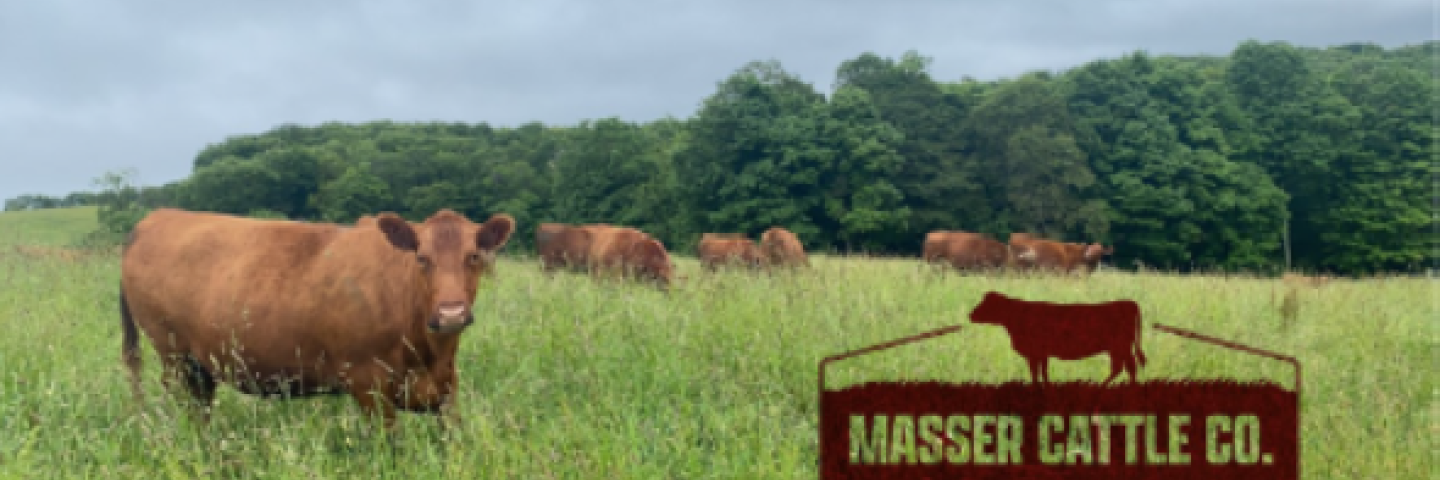Masser Cattle Co. Grazing Project

Through his partnership with NRCS, Masser has fenced animals out of a large ditch on his property, adding an additional 10 acres of pasture. He will also complete a full watering system this year that allows him to utilize the pastures in the best way possible.
By: Alicia Huber and Virgil Wilford
Alex Masser raises 25 cow-calf pairs, a bull, and eight horses on his farm in Ebensburg, Pennsylvania. Prior to working with the Natural Resource Conservation Service (NRCS), Alex had about 25 acres of pasture and was utilizing large paddock sizes for rotational grazing. Through his partnership with NRCS, he has fenced animals out of a large ditch on his property, adding an additional 10 acres of pasture. Additionally, he will complete a full watering system this year that allows him to utilize the pastures in the best way possible. Alex’s goal is to have the maximum amount of rest time on every paddock, reaching 90 – 100 days at times. He moves the cattle as he sees fit and according to what the grass needs. This means he will sometimes move the cattle two or three times a day, depending on where he is for work that day.
Alex runs an ag fencing business as well and travels around to complete projects for other people. He enjoys spreading his knowledge of what he has learned, what works and what didn’t work for him as he helps other cattle farmers in the process.
Alex started with rotationally grazing and moving cattle once or twice a week, but needed more pasture to be able to utilize the rigorous rotational grazing that he now has. There was a lack of forages available for the number of the animals that he had, and a lack of water throughout his existing grazing areas and proposed areas. A deep ravine is present that animals had access to, and he had the springs were drying up on the property. Converting the cropland to pasture has resulted in the springs no longer causing issues for him. However, this did cause some other concerns. His NRCS contract was originally supposed to have spring developments to provide water for his cattle, and once they dried up, it caused modifications to be made as an alternate source of water for the grazing system was needed. A well was dug up and only provided about one gallon per minute of flow. An additional modification was done to add a reservoir for the well to be sure that there would be enough water for the cattle in all areas of the grazing system.
Alex has installed the fence and is in the process of completing his watering system to allow the cattle full access to pasture throughout the grazing season. His focus is on having the longest rest periods possible on all pasture fields and has an attitude of “Using cattle to manage the grass, rather than using the grass to provide for the cattle.” These practices have transformed this farm from row crops to lush pastures that, with proper management, will grow deep roots and provide forage for the cattle year round. The farm has been in his wife’s family for a long time, but Alex had only raised horses prior to moving to western Pennsylvania. Now, Alex is learning and growing with his farm. He hosted his first pasture walk event in July and hopes for many more to come.
Virgil Wilford, District Conservationist for Ebensburg, has been working with Alex since the partnership began. Virgil speaks on his experience and says, “NRCS has been assisting Alex since early 2021 on this project, developing a grazing plan, scope of work, and submitting an Environmental Quality Incentives Program (EQIP) application. The application was contracted in early August of 2022 and within two weeks, a few of the practices were being installed. He has been great to work with and can’t wait to see the finished operation once all the practices have been installed.”

